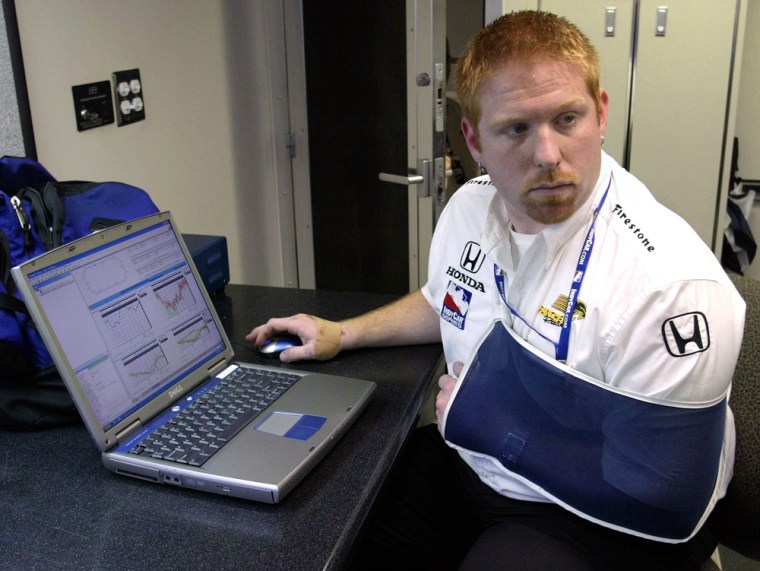Inside Panther Racing’s mobile command center at the Indianapolis Motor Speedway, Mike Sheridan reads reams of data from 75 sensors mounted to the team’s race cars.
The 27-year-old junior at IUPUI, who is studying mechanical engineering technology with an emphasis on motorsports, hopes his specialized degree and 50-hour-a-week internship will help him become an engineer for a racing team.
“It helps that I won’t have to work for three years taking out trash,” he said. “Hopefully, I’ll have my foot in the door.”
But he’ll have competition. Dozens of colleges and universities are responding to the racing industry’s growing popularity by creating motorsports programs designed to give students degrees in mechanics, engineering and management
Motorsports programs began cropping up in the mid-1990s as NASCAR’s popularity soared. Clemson and Charlotte, schools deep in the heart of NASCAR country, were among those leading the way. In 2002, NASCAR joined forces with Universal Technical Institute to open the $12-million NASCAR Technical Institute in Mooresville, N.C., to train automotive technicians.

Now, schools from Indiana to California to China are jumping into the fray. Industry experts and educators say the surge in motorsports degrees shows an acceptance of the industry in academic circles.
“I think that higher education is starting to realize that there are careers out there in significant numbers and we should develop programs to target them,” said Joe Harder, a professor of management information systems at Indiana State, which will offer a motorsports minor starting this fall.
That recognition stems from changes in the industry itself.
“It’s evolved from just a group of guys racing cars on an oval to an enormously large business that’s generating billions of dollars in revenue,” said Philip Bayster, chairman of the business department at Belmont Abbey College in Charlotte, N.C., which will launch a bachelor’s degree in business management focused on motorsports this fall.
“It’s become so sophisticated that there has to be an upgrade in the talent levels of people that are part of the industry.”
That means teaching students about the nuances of running a race track, working with exotic metals, handling corporate sponsors and the logistics of moving an entire racing team from venue to venue each weekend.

At the Indianapolis Motor Speedway, Sheridan is learning about making race cars more aerodynamic and faster as Panther’s driver, Vitor Meira, prepares for this Sunday’s Indianapolis 500. Sheridan says the internship has helped him apply the theory behind his classes in engine performance and vehicle dynamics.
“There’s a lot of stuff that’s good to understand, but you never know when you’re going to apply it,” he said. “On my first day here, I applied it.”
The programs can foster economic development. One study found the motorsports industry, which employs more than 24,000 workers in North Carolina, had a $5 billion economic impact on that state in 2003.
“It’s so easy for people to focus just on drivers,” said NASCAR spokesman Ramsey Poston. “But beyond the drivers there are crew members, mechanics and engineers, accountants, PR professionals and marketing professionals. Every day the sport gets more competitive.”
Guy Faulkner, a professor at the University of Westminster in London, has helped design motorsports programs around the world and says they can help attract students to colleges and universities.
“It’s glamorous, it’s sexy, it’s fast-moving, it’s exciting,” he said.
Europe has a long tradition of motorsports education, thanks in part to the popularity of Formula One racing. Now, academic motorsports programs are cropping up in China, Malaysia and Singapore, Faulkner said.
Kristi Willocks began her master’s degree in sports management, with a concentration in motorsports operations, at East Tennessee State in January. The longtime racing fan hopes the degree will help her get a job doing event planning at a race track.
“I don’t know 100 percent it will help me, but I think it will put me a little bit ahead of someone else who has a sports management degree,” she said.
John Griffin, a spokesman for the Indy Racing League, wouldn’t be surprised.
“I would look at motorsports, more so than any other sport out there, as a sport where the business side is such an essential part of your success,” Griffin said. “Racing has become increasingly sophisticated and a platform where someone can become educated and enter the sport being finely tuned in what he’s going to be working on. That’s an advantage for all of us.”
NASCAR driver Ryan Newman studied vehicle structure engineering at Purdue on the advice of drivers Ken Schrader and Jeff Gordon.
“I said, ’If you could do it all over again, would you go to college?’ They both said ’Yes,”’ said Newman, who graduated in 2001.
Newman says the degree has helped him better understand the science and engineering behind racing. Now, he tells budding drivers to consider a similar path.
“The people who have that engineering degree or motorsports background will have a better opportunity to be involved in NASCAR, to get what they want for a high-paying job in the future,” he said. “I don’t think it’s going to change the sport. But it’s going to be a better opportunity for them to be part of the sport.”
